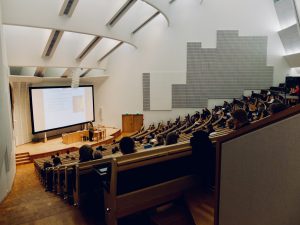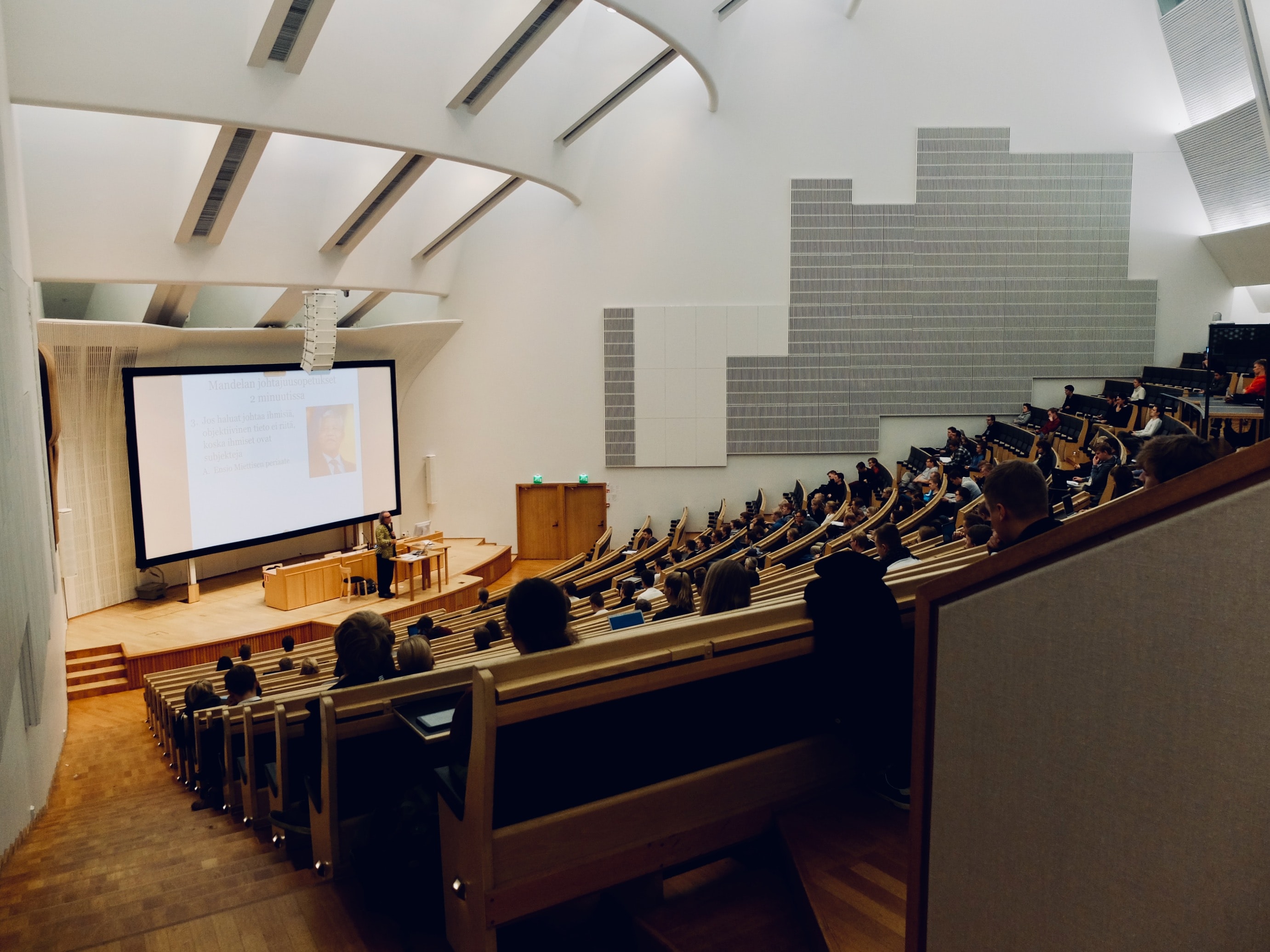The Weaponization of Academic Freedom in Higher Education
Authored by: Nina Belber, staff editor

Academic freedom has been an important concept in the American higher education system for many years. Recently, there has been a weaponization of academic freedom, where professors and scholars “attempt to provide a ‘scholarly’ veneer to what are otherwise hateful ideologies.”[1] This problem stems from the fact that people have made the concept of academic freedom synonymous with free speech.[2] The issue of believing that both are the same creates complications; personal opinions are seen as equivalent to scholarly arguments even though they are far from equal.[3]
It is fair to acknowledge that professors have the right as private citizens, to free speech. However, when professors are publishing scholarly articles or teaching students, professors are limited by the principles of academic freedom and university policies.[4] Along these lines, in their educational capacities, professors and scholars cannot claim protections under “the notions of free speech [which] is increasingly being abused by many to silence people, especially minorities and marginalized groups”, when they spread harmful and discriminatory rhetoric.[5]
Over the last few years, there has been a rise of student led organizations calling for the removal of professors who have breached the principles of academic freedom by spreading racist arguments or discriminatory comments.[6] These arguments or comments are not protected under the principles of academic freedom, because they have not gone through scholarly analysis or scrutiny.[7] Unfortunately, most of these professors have not been held accountable for their actions, and instead have been protected by universities.[8]
For example, at the University of Pennsylvania, students have rallied more than once to call for the removal of law professor Amy Wax, who has tried to hide hereliefs of white supremacy behind an “educated” theory of “cultural differences.”[9] Penn Law has yet to remove Amy Wax due to its “open expression policy, which allows her to voice her opinion as well as [others] to critique and refute her intellectually regressive proposition.”[10]
At Oxford University, students started a petition and demanding that law professor, John Finnis, be removed for standing by homophobic claims he published in a 1994 essaike Penn Law, Oxford has failed to take any meaningful action. Instead, according to Oxford’s policy on harassment, which covers freedom of speech, Finnis’ homophobia “does not amount to harassment” because it was “conducted respectfully without violating the dignity of others.”[11]
Many professors have used academic freedom, open expression, or whatever other term as an excuse to “promote racist and colonizing ideologies, misplaced convictions, and unsubstantiated claims” while also shielding them from the consequences of their actions.[12]
In contrast to the above examples, Scott Senjo, a criminal justice professor at Weber State University, resigned once students started an online petition for Senjo’s removal after he had criticized protesters against police brutality.[13] Webster denounced Senjo’s statement, claiming that it was “hurtful and inconsistent with the values of Weber State University and [its] work to create an inclusive and welcoming environment.”[14] However, the university refused to acknowledge that it had forced Senjo to resign.[15]
Other instances, like the one mentioned above, prove that while academic freedom can be weaponized for harmful reasons, it can also be used by students to hold professors accountable and to protect the rights of silenced and minority populations.[16] Interestingly, in all three situations, the universities released statements that removed the universities from choosing sides, taking no real actions to hold their professors accountable.[17] As academic freedom continues to be abused as a shield for dogmatic arguments and opinions, universities should take stand to protect students and education.
[1] Farhana Sultana, The false equivalence of academic freedom and free speech Defending academic integrity in the age of white supremacy, colonial nostalgia, and anti-intellectualism, 17 ACME: Int’l J. for Critical Geographies 278, 230 (2018).
[2] Id. at 230–37.
[3] Id. at 233.
[4] Robert Mark Simpson, The Relation between Academic Freedom and Free Speech, 130 Ethics 287, 292 (2020).
[5] Sultana, supra, at 230.
[6] Bruce Shen, Amy Wax doesn’t understand culture, Daily PA. (Oct. 22, 2020), https://www.thedp.com/article/2020/10/upenn-amy-wax-racism-ivy-league; Colleen Flaherty, Saying the Wrong Thing, Inside Higher Ed (June 4, 2020), https://www.insidehighered.com/news/2020/06/04/professor-resigns-after-criticizing-protesters-and-another-faces-calls-his; Alex Benn & Daniel Taylor, We don’t think John Finnis should teach at Oxford University: Here’s why, GUARDIAN (JAN. 11, 2019), https://www.theguardian.com/commentisfree/2019/jan/11/john-finnis-oxford-university-academic-freedom-law.
[7] See Sultana, supra, at 237.
[8] Randall G. Bowden, The Postsecondary Professoriate: Problems of Tenure, Academic Freedom, and Employment Law, 13 Acad. of Educ. Leadership J. 17, 22 (2009).
[8] Bruce Shen, Amy Wax doesn’t understand culture, Daily PA. (Oct. 22, 2020), https://www.thedp.com/article/2020/10/upenn-amy-wax-racism-ivy-league; Colleen Flaherty, Saying the Wrong Thing, Inside Higher Ed (June 4, 2020), https://www.insidehighered.com/news/2020/06/04/professor-resigns-after-criticizing-protesters-and-another-faces-calls-his; Alex Benn & Daniel Taylor, We don’t think John Finnis should teach at Oxford University: Here’s why, GUARDIAN (JAN. 11, 2019), https://www.theguardian.com/commentisfree/2019/jan/11/john-finnis-oxford-university-academic-freedom-law.
[9] Joe Patrice, Amy Wax’s Racist Remarks Force Penn Law School to Let Her Take a Paid Vacation, Above the L. (July 24, 2019), https://abovethelaw.com/2019/07/amy-waxs-racist-remarks-force-penn-law-school-to-let-her-take-a-paid-vacation/.
[10] Bruce Shen, Amy Wax doesn’t understand culture, Daily Pa. (Oct. 22, 2020), https://www.thedp.com/article/2020/10/upenn-amy-wax-racism-ivy-league.
[11] Id.
[12] Sultana, supra, at 236.
[13] Colleen Flaherty, Saying the Wrong Thing, Inside Higher Ed (June 4, 2020), https://www.insidehighered.com/news/2020/06/04/professor-resigns-after-criticizing-protesters-and-another-faces-calls-his.
[14] Id.
[15] Id.
[16] William G. Tierney, Academic Freedom and the Parameters of Knowledge, 65 Harv. Educ. Rev. 143, 159 (1993).
[17] Bruce Shen, Amy Wax doesn’t understand culture, Daily PA. (Oct. 22, 2020), https://www.thedp.com/article/2020/10/upenn-amy-wax-racism-ivy-league; Colleen Flaherty, Saying the Wrong Thing, Inside Higher Ed (June 4, 2020), https://www.insidehighered.com/news/2020/06/04/professor-resigns-after-criticizing-protesters-and-another-faces-calls-his; Alex Benn & Daniel Taylor, We don’t think John Finnis should teach at Oxford University: Here’s why, GUARDIAN (JAN. 11, 2019), https://www.theguardian.com/commentisfree/2019/jan/11/john-finnis-oxford-university-academic-freedom-law.
